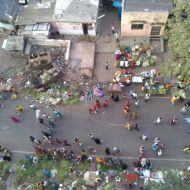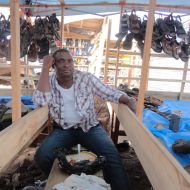Amid Syringes and Skin-Burning Acid, a Search for Scrap Metal and Cell Phones
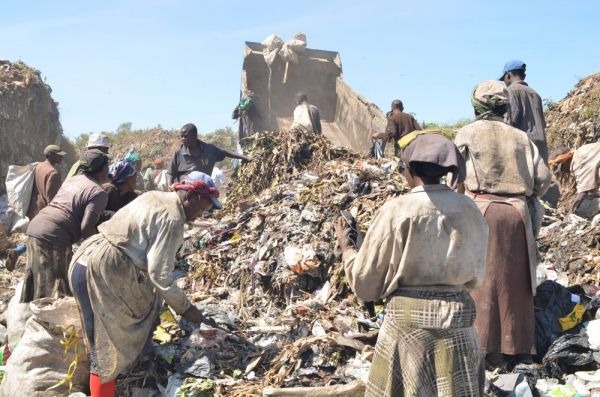
For trash pickers at Dandora, the dump is a necessary evil.
Hundreds of bent figures wade through a sea of trash. They pick their way across the smoldering landscape, stabbing at the garbage in front of them with bent metal rods. A flock of marabou storks flaps alongside, stalking for bones to snap up in their huge bills. In the distance, skyscrapers wobble in the rising heat waves.
The bent figures are the garbage pickers of Dandora, Nairobi’s main trash dump and one of Africa’s biggest. They make their living here by sifting through a society’s discards in hopes of finding anything to sell.
Dandora dump site covers 30 acres and is well over a decade old. It receives 2,000 tons of waste every day and is almost entirely unregulated. Children in nearby communities are poisoned by the dump with dangerous concentrations of lead and other heavy metals in their blood. The site is filled past capacity and should have been closed years ago.
But the garbage pickers who work there say they can’t live without it.
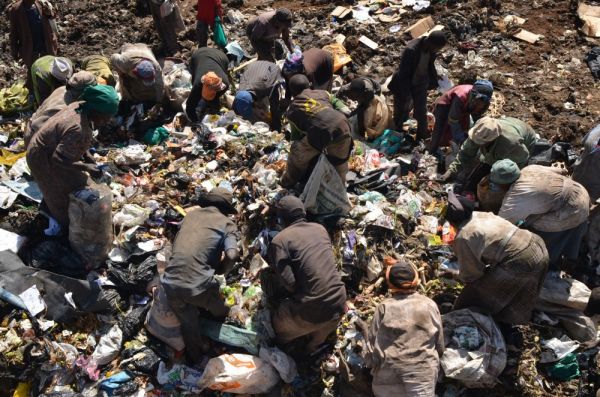
A group of pickers descends on a fresh pile of trash, looking for anything valuable.
“This place, it really helps me,” said Eric Kariuki, 25, a tall man in a blue jumpsuit. “Every time I hear the rumors about Dandora dump site is moving, I feel worried.”
For years, there’s been talk of shutting Dandora and building a new dump elsewhere, but to the relief of Kariuki and his colleagues, no action has been taken. So every morning they head to the dump to make their informal wages off of what the rest of the city throws away. In doing so, they fill the biggest gap in Nairobi’s waste management: They sort the trash, one piece at a time, with their bare hands. Gloves, one said, slow them down.
A picker earns only a few hundred shillings a day selling scrap. A few have second jobs at the dump to boost their income, like bringing pigs to graze on the garbage. Kariuki, who’s worked at the dump site since he was 13, drives a tractor for seven hours each day to flatten the piles of trash. “I learned [to drive] just from being around here asking for a shift,” he said. The tractor work earns him 300 extra shillings a day ($3.50), and he hopes his skills might someday land him a better job.
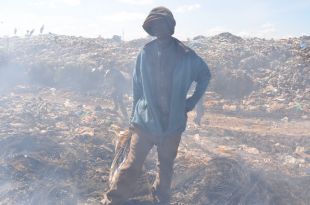
Michael Muriani laughes amid the burning trash at Dandora, where he’s been working for the past year.
A day at the dump begins with breakfast. Just past dawn, a highly anticipated truck arrives from Jomo Kenyatta International Airport carrying leftover in-flight meals, and dozens scramble for a bite. Kariuki knows his preferences. “Me, I only eat the meat, the yogurt,” he said. And to drink? “The juice. Del-Monte.”
Not everyone enjoys such spoils. Mary Waithara, 30, who wears a floppy beige hat to shield her from the sun, misses the airport truck because she has two children to take to school in the morning before she starts picking. Instead, she relies on a group of women with charcoal stoves and thermoses who perch themselves atop one of the taller trash heaps. They are the dump site’s makeshift cafeteria, open all day selling fried dough cakes, stew and cups of hot fermented porridge.
The sun up, trucks rumble in over the plain of junk. On busy days, they bottleneck into traffic jams between the two-story hills of trash. The trucks’ employees unload their cargo before taking first pick in the fresh piles, looking for valuables like jewelry, while the pickers — men, women and children — stand by and patiently wait their turn. Once the truck drivers finish, it’s every picker for himself. They gather cardboard to patch up walls and Styrofoam packing material to sell as couch stuffing. They gather scraps of metal, glass and certain plastics to sell to recyclers. They gather spoiled food to feed chickens at home. When they’re done, the only items left behind are the most blatantly worthless – flimsy plastic bags, hair weaves.
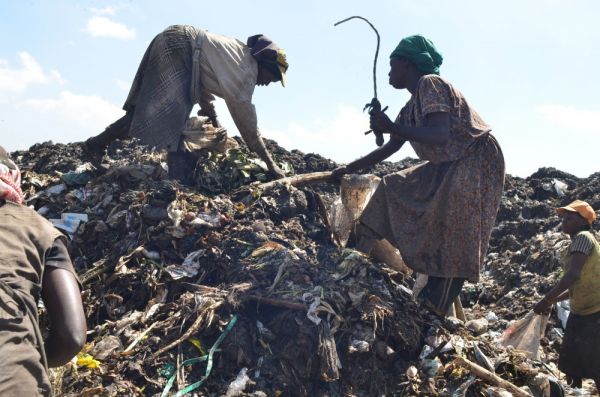
Two trash pickers sift through a fresh pile of garbage.
Nearly everyone said they want to work elsewhere, even if they all oppose closing the dump. “This place is not fit for human beings,” said Irene Wambui, a 32-year-old mother of five searching for plastic. Wambui said that women have it especially hard because they must sacrifice work time to care for their children. She is stretched so thin that her eldest, a 16-year-old daughter, had to drop out of school and start working at the dump too.
But Michael Muriani, who was digging for scrap metal with a wooden stick by some burning tires, said he prefers working at Dandora. “I used to work in a market back in town,” he said as he pulled a pair of heavy rusted scissors from beneath the ash and tossed it into his bag. “I left because the boss was harsh.”
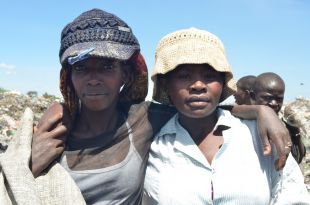
Irene Wambui, left, and Mary Waithara, two trash pickers at Dandora. Though they both barely make a living and would like another job, they do not want the dumpsite closed.
Since they don’t wear gloves, the pickers’ hands are scarred with small cuts from broken glass and syringes. When they get a cut, they rub snuff, which the men snort for energy, on the wounds and move on. Some pickers wear knee-high rubber boots, not only to keep muck out, but in case they step through a layer of trash into skin-burning chemical waste below. “Boiling,” they call such accidents.
Occasionally, pickers find small treasures. A picker in his fifties named Edward Ndichu Thinji found his first cell phone at the dump seven years ago. “Brand new Motorola,” he said smiling. “I gave it to my wife.” Others keep an eye out for silver chain necklaces, worth 700 to 1500 shillings ($8.25 to $17.60) each, which they wear as a sort of flashy insurance for when money gets tight.
Thinji, who’s worked at the dump for fourteen years, said he also once found a calculator, which he gave to a nephew so he could finish high school. Most Nairobians view Dandora as a place of poverty and filth, where gangsters are rumored to lurk among the hills of trash. But to Thinji, the dump is a source of pride. It’s how he put his children through school. “Fourteen years is a long time,” he said, surveying the acres of rubbish. “And now they are grown up.”
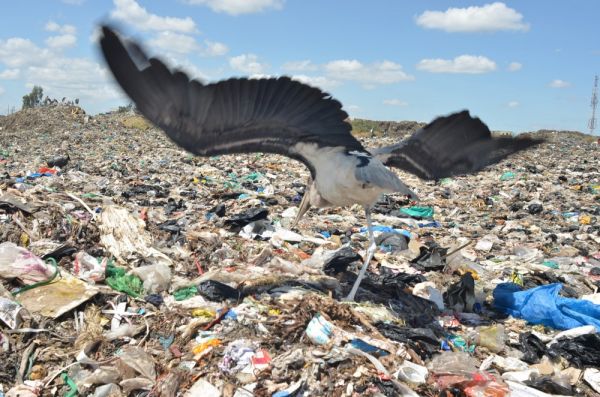
A marabou stork flies away at Dandora dumpsite.
By six in the afternoon, the pickers have hauled their sacks of plastic and metal to be weighed and sold to middlemen, who would eventually re-sell them in bulk to bigger recyclers. The middlemen bought kilos of thick plastic for three shillings and kilos of plastic bottles for six. Scrap metal was most lucrative, going for up to fifteen shillings a kilo. When it was done, the most successful picker had earned 400 shillings, about $4.60 USD for a full day’s work at Nairobi’s Dandora dump.
Photos by Jason Patinkin


